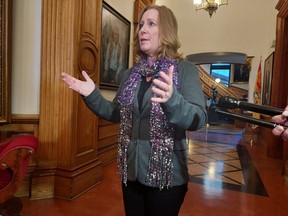International students ‘key component’ of N.B. housing crisis: minister
But Jill Green isn’t calling for a cap, acknowledging province’s post secondary institutions need international recruits

Article content
Social Development Minister Jill Green says the housing crisis in New Brunswick is being fueled, in part, by an increase in international students.
But Green isn’t calling for a cap, acknowledging the province’s post secondary institutions need international recruits to keep growing.
Instead, she says there needs to be a focus on building more student housing to fill demand as New Brunswick’s universities are increasingly relying on undergrads from overseas to grow their student populations, and revenue streams.
The housing crisis is, in part, being blamed on an increase in migrants and international students fueling demand for homes.
That’s as inflation has slowed construction.
It has federal ministers now saying the system, which currently brings 800,000 students a year to Canada, was not designed to be a cash cow for universities and colleges, while considering a cap on students from abroad.
“It definitely is a key component,” Green said in an interview with Brunswick News on whether international student recruitment is to blame for the rising cost of rent and low vacancy rates in New Brunswick’s three major cities.
“We recognize there’s a pressure there and have put some programs in place through our housing for all strategy related to student housing, but we know we can do a lot more there,” she added.
But Green isn’t interested in curbing the rising number of international students.
“There’s pressure on our educational institutions too to grow,” she said.
“They have talked to us about their concerns.”
She added: “I think what we need to do is plan for success and just keep everything rolling as fast as we can.”
New Brunswick’s public post-secondary institutions welcomed close to 4,000 international students last year, according to data from the Association of Atlantic Universities.
But it’s a number that has suddenly spiked.
A total of 3,907 full-time students in the province had student visas to study in 2022. That’s up 22 per cent from 3,187 students the year before.
It’s a number that increased even through the pandemic from 2,050 in 2017, according to Association of Atlantic Universities figures.
Over the last year alone, the number of full-time visa students jumped by 369 students at the University of New Brunswick and by 332 at the Université de Moncton.
It undoubtedly increases a university’s revenue stream.
A year’s tuition towards a general Arts degree at University of New Brunswick costs $8,177 for domestic students.
That figure is $19,148 for international students, according to the university’s website.
Meanwhile, tuition toward an Engineering degree is $11,327 for domestic students, but $22,297 for international students. UNB revenue from tuition climbed to $110 million last year, from $101 million the year before, and $93 million two years ago.
Meeting with housing ministers from across the region in Halifax on Monday, federal Housing Minister Sean Fraser said this is a problem.
The federal Liberals have raised Canada’s immigration levels considerably, and have a target of 500,000 new permanent residents per year in 2025 and beyond.
But international students are considered temporary residents, as are people in Canada on work permits, and aren’t subject to the same caps.
“The immigration levels plan is focused on permanent residents that Canada brings in each year, many of whom already live here and are transitioning from temporary residency to permanent residency,” Fraser said in Halifax.
“The challenge that we have when it comes to our growing population that is putting an impact on our housing programs is largely through our temporary programs, so the temporary foreign workers program or particularly the international students program.
“This is where we have an issue that we need to address and are working to address now.”
Fraser said the number of international students has grown by “hundreds of thousands” in each of the last few years.
“There are some institutions in different parts of this country that I have the sincerely-held belief have come to exist just to exploit the program for the personal financial gains of the people behind some of these schools, if we can call them that,” he said.
Fraser said the feds are now working to create a “trusted partner” model for post-secondary institutions who will get priority access to study permits that have housing available.
When asked specifically about any abuses of the system from regional universities, Fraser said he didn’t see those local institutions as part of the problem.
Green said the housing crisis is complex and isn’t as simple as capping newcomers.
“Part of this issue here is that there is not one individual contributing factor and that’s why there’s not one answer that anybody can implement that will completely change what’s going on,” Green said.
“We have interprovincial migration, we have newcomers coming to Canada, we have the students, and we’re having an economic boom, which is a fantastic thing, but then we need the workforce to support that.
“You can’t look at anything in isolation, each one is a contributing factor to it.”












Postmedia is committed to maintaining a lively but civil forum for discussion. Please keep comments relevant and respectful. Comments may take up to an hour to appear on the site. You will receive an email if there is a reply to your comment, an update to a thread you follow or if a user you follow comments. Visit our Community Guidelines for more information.